 |
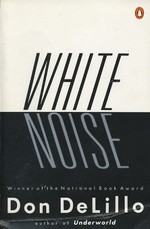
White Noise by Don DeLillo
This is just one of those novels that imprinted on me in ways I don’t fathom, and it all started like this.
The station wagons arrived at noon, a long shining line that coursed through the west campus. In single file they eased around the orange I-beam sculpture and moved toward the dormitories. The roofs of the station wagons were loaded down with carefully secured suitcases full of light and heavy clothing; with boxes of blankets, boots and shoes, stationery and books, sheets, pillows, quilts; with rolled-up rugs and sleeping bags; with bicycles, skis, rucksacks, English and Western saddles, inflated rafts. As cars slowed to a crawl and stopped, students sprang out and raced to the rear doors to being removing the objects inside; the stereo sets, radios, personal computers; small refrigerators and table ranges; the cartons of phonograph records and cassettes; the hairdryers and styling irons; the tennis rackets, soccer balls, hockey and lacrosse sticks, bows and arrows; the controlled substances, the birth control pills and devices; the junk food still in shopping bags—onion-and-garlic chips, nacho things, peanut creme patties, Waffelos and Kabooms, fruit chews and toffee popcorn; the Dum-Dum pops, the Mystic mints.
I’ve witnessed this spectacle every September for twenty-one years. It is a brilliant event, invariable. The students greet each other with comic cries and gestures of sodden collapse. Their summer has been bloated with criminal pleasures, as always. The parents stand sun-dazes near their automobiles, seeing images of themselves in every direction. The conscientious suntans. The well-made faces and wry looks. They feel a sense of renewal, of communal recognition. The women crisp and alert, in diet trim, knowing people’s names. Their husbands content to measure out the time, distant but ungrudging, accomplished in parenthood, something about them suggesting massive insurance coverage. This assembly of station wagons, as much as anything they might do in the course of the year, more than formal liturgies or laws, tells the parents they are a collection of the like-minded and the spiritually akin, a people, a nation.
|
 |

The Violent Bear It Away by Flannery O’Connor
O’Connor’s the perfect mix of Southern sensibility, Roman Catholic worldview, and glorious prose.
FRANCIS MARION TARWATER’S uncle had been dead for only half a day when the boy got too drunk to finish digging his grave and a Negro named Buford Munson, who had come to get a jug filled, had to finish it and drag the body from the breakfast table where it was still sitting and bury it in a decent and Christian way, with the sign of its Saviour at the head of the grave and enough dirt on top to keep the dogs from digging it up. Buford had come along about noon and when he left at sundown, the boy, Tarwater, had never returned from the still.
The old man had been Tarwater’s great-uncle, or said he was, and they had always lived together so far as the child knew. His uncle had said he was seventy years of age at the time he had rescued and undertaken to bring him up; he was eighty-four when he died. Tarwater figured this made his own age fourteen. His uncle had taught him Figures, Reading, Writing, and History beginning with Adam expelled from the Garden and going on down through the presidents to Herbert Hoover and on in speculation toward the Second Coming and the Day of Judgment.
|
 |
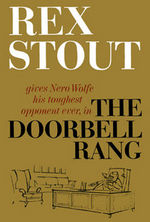
The Doorbell Rang by Rex Stout
I could’ve filled this list with Stout beginnings. But I limited myself to this one.
Since it was deciding factor, I might as well begin by describing it. It was a pink slip of paper three inches wide and seven inches long, and it told the First National City Bank to pay to the order of Nero Wolfe one hundred thousand and 00/100 dollars. Signed, Rachel Bruner. It was there on Wolfe’s desk, where Mrs. Bruner had put it. After doing so, she had returned to the red leather chair.
|
 |
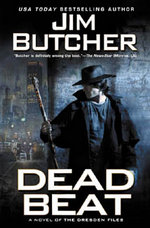
Dead Beat by Jim Butcher
The first words I read by Butcher, got me hooked but good.
On the whole, we’re a murderous race.
According to Genesis, it took as few as four people to make the planet too crowded to stand, and the first murder was a fratricide. Genesis says that in a fit of jealous rage, the very first child born to mortal parents, Cain, snapped and popped the first metaphorical cap in another human being. The attack was a bloody, brutal, violent, reprehensible killing. Cain’s brother Abel probably never saw it coming.
As I opened the door to my apartment, I was filled with a sense of empathic sympathy and intuitive understanding.
For freaking Cain.
|
 |
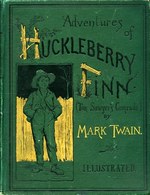
Adventures of Huckleberry Finn by Mark Twain
This was the hardest cut from last week’s list, but I just can’t resist the moocow.
You don’t know about me without you have read a book by the name of The Adventures of Tom Sawyer; but that ain’t no matter. That book was made by Mr. Mark Twain, and he told the truth, mainly. There was things which he stretched, but mainly he told the truth. That is nothing. I never seen anybody but lied one time or another, without it was Aunt Polly, or the widow, or maybe Mary. Aunt Polly—Tom’s Aunt Polly, she is—and Mary, and the Widow Douglas is all told about in that book, which is mostly a true book, with some stretchers, as I said before.
Now the way that the book winds up is this: Tom and me found the money that the robbers hid in the cave, and it made us rich. We got six thousand dollars apiece—all gold. It was an awful sight of money when it was piled up. Well, Judge Thatcher he took it and put it out at interest, and it fetched us a dollar a day apiece all the year round—more than a body could tell what to do with. The Widow Douglas she took me for her son, and allowed she would sivilize me; but it was rough living in the house all the time, considering how dismal regular and decent the widow was in all her ways; and so when I couldn’t stand it no longer I lit out. I got into my old rags and my sugar-hogshead again, and was free and satisfied. But Tom Sawyer he hunted me up and said he was going to start a band of robbers, and I might join if I would go back to the widow and be respectable. So I went back.
|
 |
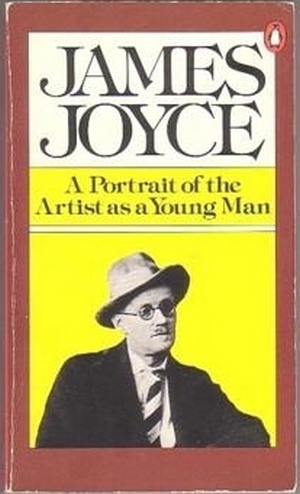
A Portrait of the Artist as a Young Man by James Joyce
I remember in our English class in High School when we were assigned this book, pretty much no one was interested. When Mr. Russo passed out the paperbacks, a few of us flipped it opened and read these first words—and suddenly we were open to the idea (didn’t last long for all of us, but that’s beside the point, we’re focused on the opening lines here). It’s stuck with me for almost 30 years, that’s gotta say something.
Once upon a time and a very good time it was there was a moocow coming down along the road and this moocow that was coming down along the road met a nicens little boy named baby tuckoo….
|
 |
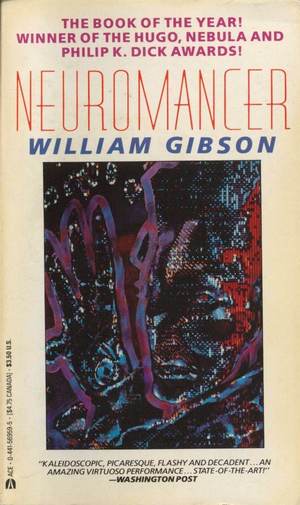
Neuromancer by William Gibson
This sentence was love at first glance for me. Still love it. Naturally, no one knows what color this is referring to anymore.
The sky above the port was the color of television, tuned to a dead channel.
“It’s not like I’m using,” Case heard someone say, as he shouldered his way through the crowd around the door of the Chat. “It’s like my body’s developed this massive drug deficiency.” It was a Sprawl voice and a Sprawl joke. The Chatsubo was a bar for professional expatriates; you could drink there for a week and never hear two words in Japanese.
Ratz was tending bar, his prosthetic arm jerking monotonously as he filled a tray of glasses with draft Kirin. He saw Case and smiled, his teeth a webwork of East European steel and brown decay. Case found a place at the bar, between the unlikely tan on one of Lonny Zone’s whores and the crisp naval uniform of a tall African whose cheekbones were ridged with precise rows of tribal scars. “Wage was in here early, with two joeboys,” Ratz said, shoving a draft across the bar with his good hand. “Maybe some business with you, Case?”
Case shrugged. The girl to his right giggled and nudged him.
The bartender’s smile widened. His ugliness was the stuff of legend. In an age of affordable beauty, there was something heraldic about his lack of it.
|
 |
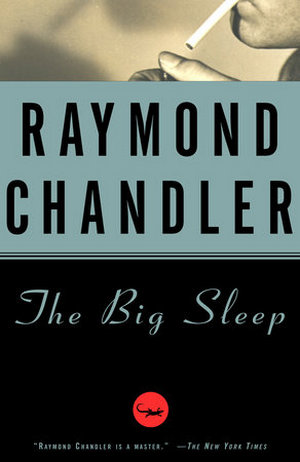
The Big Sleep by Raymond Chandler
Oft-parodied. Oft-imitated. Often-celebrated. Does it get better than this?
It was about eleven o’clock in the morning, mid October, with the sun not shining and a look of hard wet rain in the clearness of the foothills. I was wearing my powder-blue suit, with dark blue shirt, tie and display handkerchief, black brogues, black wool socks with dark blue clocks on them. I was neat, clean, shaved and sober, and I didn’t care who knew it. I was everything the well-dressed private detective ought to be. I was calling on four million dollars.
The main hallway of the Sternwood place was two stories high. Over the entrance doors, which would have let in a troop of Indian elephants, there was a broad stained-glass panel showing a knight in dark armor rescuing a lady who was tied to a tree and didn’t have any clothes on but some very long and convenient hair. The knight had pushed the vizor of his helmet back to be sociable, and he was fiddling with the knots on the ropes that tied the lady to the tree and not getting anywhere. I stood there and thought that if I lived in the house, I would sooner or later have to climb up there and help him. he didn’t seem to be really trying.
|
 |
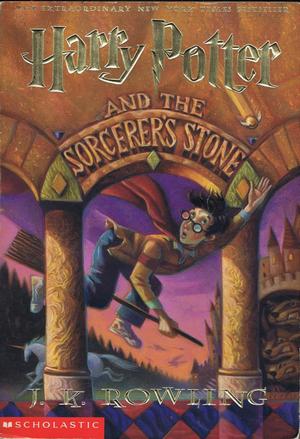
Harry Potter and the Sorceror’s Stone by J. K. Rowling
Why bother saying anything here?
Mr. and Mrs. Dursley, of number four Privet Drive, were proud to say that they were perfectly normal, thank you very much. They were the last people you’d expect to be involved in anything strange or mysterious, because they just didn’t hold with such nonsense.
|
 |
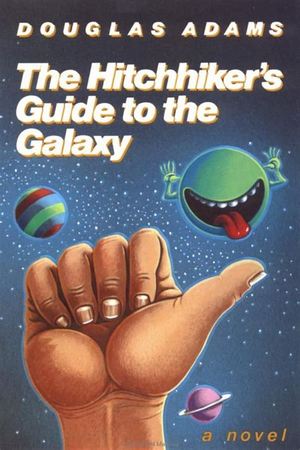
The Hitchhiker’s Guide to the Galaxy by Douglas Adams
Far out in the uncharted backwaters of the unfashionable end of the Western Spiral arm of the Galaxy lies a small unregarded yellow sun.
Orbiting this at a distance of roughly ninety-eight million miles is an utterly insignificant little blue-green planet whose ape-descended life forms are so amazingly primitive that they still think digital watches are a pretty neat idea.
This planet has—or rather had—a problem, which was this: most of the people living on it were unhappy for pretty much of the time. Many solutions were suggested for this problem, but most of these were largely concerned with the movement of small green pieces of paper, which was odd because on the whole it wasn’t the small green pieces of paper that were unhappy.
And so the problem remained; lots of the people were mean, and most of them were miserable, even the ones with digital watches.
|


![]()






















Bookstooge
Top 10 Opening “Page” just doesn’t quite have the same ring to it 😉
HCNewton
LOL! I kept myself to under a page… Mostly.
Bookstooge
I’m very proud of your restraint…
lydiaschoch
That James Joyce quote was great!
My TTT .
susanblogginboutbooks
I actually like having the whole paragraph (or so) instead of just one line. Some openers just don’t work as well without the next few sentences. For instance, I used a quote on my list that commenters find funny. If you look at the next sentences, though, you see that what the character and her mule are seeing is a Black man hanging from a tree. The tone of the opening line really depends on the next sentences. Interesting.
Happy TTT (on a Wednesday)!
Susan
http://www.blogginboutbooks.com